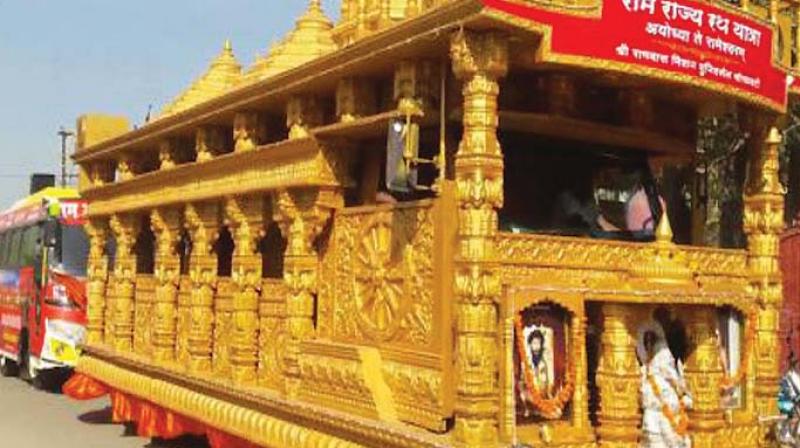Opposing everything becoming a way of life
The movement of the rath was needlessly politicised with the opposition wanting the procession to be stopped from entering the state.

The Ram Rajya Rath Yatra passed through Tamil Nadu on its way to Kerala. Having journeyed through several states, including Congress-ruled Karnataka, the rath moved through our state too. The fuss they made about the rath was unique. But then many of the issues are unique to Tamil Nadu, communally the most peaceful state for a long time in history, including during the riots elsewhere in India in the wake of the Babri Masjid demolition and the subsequent Mumbai blasts.
The movement of the rath was needlessly politicised with the opposition wanting the procession to be stopped from entering the state. The rath came and went and even its most diehard fan would not have thought too much of its impact on the building of a Ram temple in Ayodhya. Hundreds of rallies take place every year for myriad causes and what contribution they make to those espoused is hard to gauge. Regardless of the real import of their causes, rallies and raths do the most to incommode the daily life of the citizens.
As the gathering of crowds can be explosive enough to turn into law and order issues, police swing into preparatory action and the milling crowds and the traffic jams serve only to inconvenience the people. It is, however, the duty of any government to ensure peace and orderliness. How can a government be expected to ban one rath on the supposed apprehension of its opponents that communal tensions could flare up while allowing a rally of other religious groups?
The Chief Minister was on solid ground when he said that in a secular state like Tamil Nadu all religions are equal.
Pandering to votebanks or practising appeasement politics alone could have led to all those calls for banning the rath. Muslim women turned out just a day before the rath to oppose the Bill on instant triple talaq. They may have been opposing what appears to be a genuine social reform that elicited a major emotive response nationally. But their right to express their point of view had to be upheld. They were allowed to gather and demonstrate their opposition to a reform that has been well received in most other parts of India.
The feeling that Tamil Nadu is unique in many ways is merely emphasised each time Tamils go against the grain of national thinking. The number of things opposed in the state is pretty high, beginning with the Kudankulam nuclear power plant through the project to extract methane and a national gas pipeline from one state to another down to the neutrino laboratory. Leaving aside the nitty-gritty of each of those projects, does it not sound somewhat curious that there are so many issues to which this one state is opposed? Prolonged agitations show a pattern of resistance that goes beyond the normal.
There may be a slew of reasons to oppose any project. The Kudankulam plant is not exactly operating at anywhere near optimal efficiency although its safety parameters are far superior to those of Fukushima and older nuclear plants. But the sustained campaign against the plant that ran for years led to suspicions over a foreign hand interceding in matters pertaining to another country. The demos against the plant were certain to be intense locally because safety, or lack of it, is going to affect them the most. However, more than just nuclear fears seemed to cloud the issue.
The resistance of the Greens to the neutrino lab in the Theni hills seemed a valid enough exercise and just when it seemed the environmentalists may have succeeded in bottling up the project comes the news that conditional clearances have been granted. While it becomes a little more difficult to justify pure research in a pristine part of the hills involving the digging of massive tunnels, it did seem that Tamil Nadu was building up a record of opposing anything that represents progress in the perspective of others. The absence of central projects in Tamil Nadu has been glaring for long and despite governments of the past being partners at the Centre.
The toxic impact of industrial expansion, particularly in petrochemicals can be felt more when untoward things happen. But where Tamil Nadu seems to go wrong is in opposing anything and everything under the guise of preserving what is essentially land resources. The land of the freebies does not, however, think too deeply about job creation or individual empowerment through minor entrepreneurship either. Opposing projects becomes easier when you wish to drag things down to the status quo and let the lowest common denominator determine everything. If Tamil Nadu were to be brought to a standstill, or, better still, taken back to the Sangam Age on a time machine, a lot of people would be pleased.
(R. Mohan is the Resident Editor of the Chennai and Tamil Nadu editions of Deccan Chronicle)

